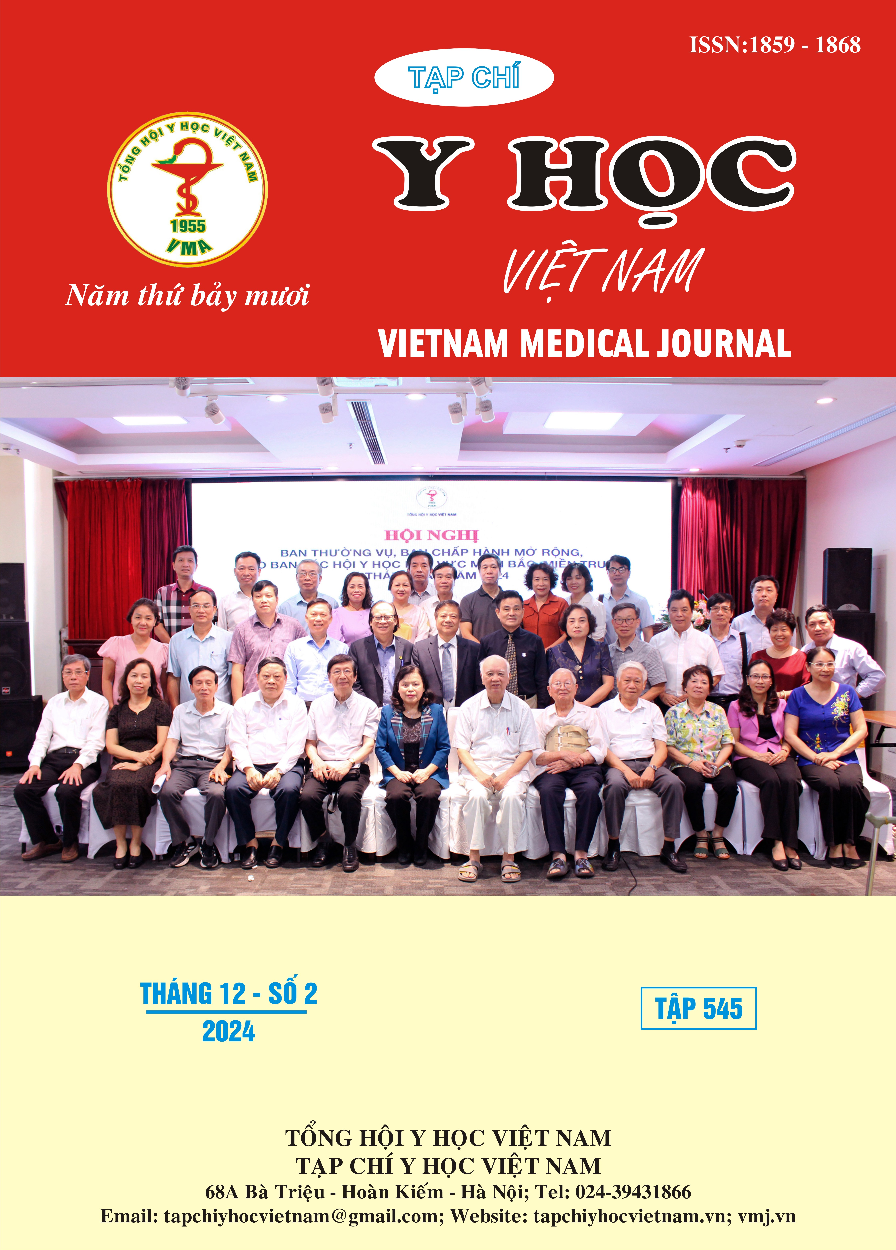CLINICAL CHARACTERISTICS, NEUROPSYCHOLOGICAL TESTS AND BRAIN MAGNETIC RESONANCE IMAGING IN ELDERLY PATIENTS WITH MILD COGNITIVE IMPAIRMENT AFTER CEREBRAL INFARCTION
Main Article Content
Abstract
Background: Stroke (the majority is ischemia) is one of diseases having highest mortality rate in the world and leaves many severe sequelae for patients, especially cognitive impairment and dementia. Post-cerebral infarction cognitive impairment not only increase the rate of disability, severely affect the quality of life but also create a burden for families and society. Objective: Describe the clinical characteristics, some neuropsychological tests and brain magnetic resonance imaging of elderly patients with post-cerebral infarction mild cognitive impairment (MCI) at the National Geriatric Hospital (NGH). Subjects and methods: A descriptive case series study was conducted on 50 post-cerebral infarction MCI in or out patients at the NGH from 8/2023 to 7/2024. Results: The study population had an average age of 71.28 ± 6.34. Memory, executive function and visuospatial function were the three domains of impairment with the highest rates, 96.0%, 70.0%, 56.0%, respectively. The majority of MCI patients had deficits in three or more domains (62.0%). The average score of the Moca test was 20.48 ± 2.32. Delayed word recall (84.0%), delayed picture recall (86.0%), clock drawing test (78.0%), backward list of number (56.0%), frontal lobe assessment (38.0%) were the tests with the highest rate of abnormalities. The location of infarction in both cerebral hemispheres (42.0%), subcortical (68.0%) and frontal lobe infarction (36.0%) was the most common lesion location. Conclusion: Post-cerebral infarction mild cognitive impairment includes impairment in many different cognitive domains, of which the most affected are memory, visuospatial and executive functions. Brain MRI lesions are also varied with more infarcts in the subcortex and hemispheres
Article Details
Keywords
: Mild cognitive impairment, cerebral infarction
References
2. Ma F, Zhang Q, Li J, Wu L, Zhang H. Risk factors for post-cerebral infarction cognitive dysfunction in older adults: a retrospective study. BMC Neurol. 2024;24:72. doi:10.1186/s12883-024-03574-7
3. Dong L, Briceno E, Morgenstern LB, Lisabeth LD. Poststroke Cognitive Outcomes: Sex Differences and Contributing Factors. J Am Heart Assoc. 2020;9(14):e016683. doi:10.1161/ JAHA.120.016683
4. Cho SJ, Yu KH, Oh MS, et al. Post-stroke memory impairment among patients with vascular mild cognitive impairment. BMC Neurol. 2014; 14:244. doi:10.1186/s12883-014-0244-6
5. Narasimhalu K, Ang S, De Silva DA, et al. Severity of CIND and MCI predict incidence of dementia in an ischemic stroke cohort. Neurology. 2009;73(22): 1866-1872. doi:10.1212/ WNL. 0b013e3181c3fcb7
6. Cumming TB, Marshall RS, Lazar RM. Stroke, cognitive deficits, and rehabilitation: still an incomplete picture. Int J Stroke. 2013;8(1):38-45. doi:10.1111/j.1747-4949.2012.00972.x
7. Stephens S, Kenny RA, Rowan E, et al. Neuropsychological characteristics of mild vascular cognitive impairment and dementia after stroke. Int J Geriatr Psychiatry. 2004;19(11): 1053-1057. doi:10.1002/gps.1209
8. Alphonce B, Meda J, Nyundo A. Incidence and predictors of post-stroke cognitive impairment among patients admitted with first stroke at tertiary hospitals in Dodoma, Tanzania: A prospective cohort study. PLoS One. 2024;19(4): e0287952. doi:10.1371/journal.pone. 0287952
9. Lê Đình Toàn, Nguyễn Hoàng Ngọc. Nghiên cứu tình hình suy giảm nhận thức ở bệnh nhân sau đột quỵ não cấp bằng thang điểm đánh gia tâm thần tối thiểu MMSE. tạp chí Y dược học Quân sự. 2013;38(1):117-123.
10. Yang T, Deng Q, Jiang S, et al. Cognitive impairment in two subtypes of a single subcortical infarction. Chin Med J (Engl). 2021;134(24):2992-2998. doi:10.1097/CM9.0000000000001938


